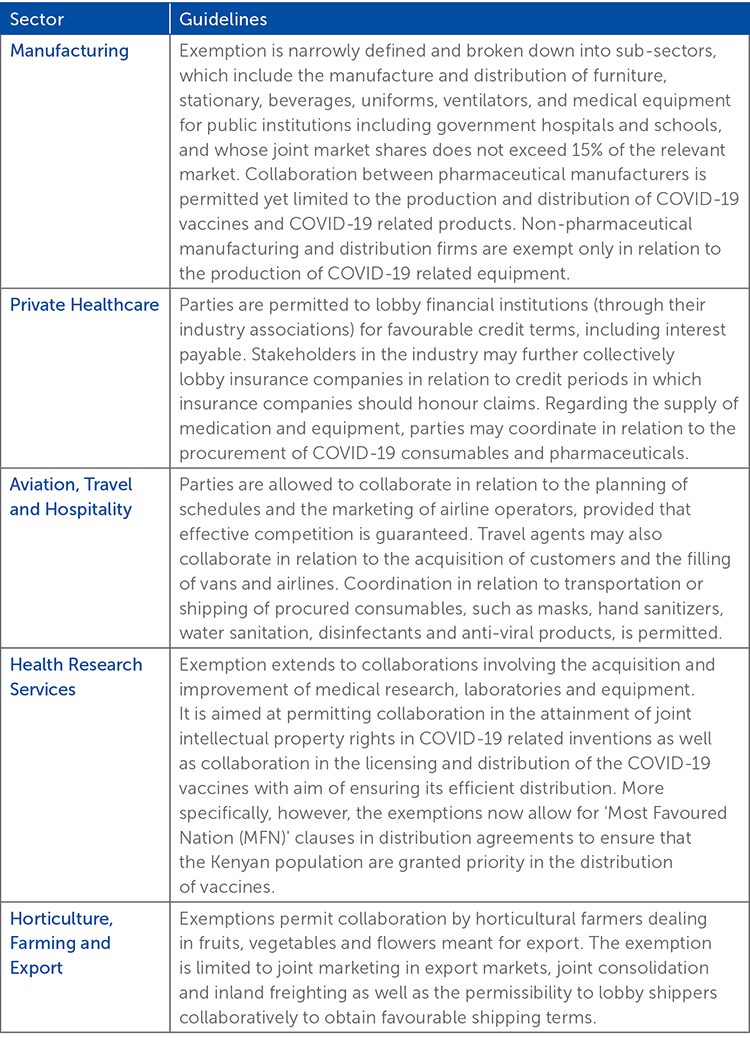Competition and COVID-19 – steps to economic recovery in Kenya
At a glance
- The Competition Authority of Kenya (CAK) recognizes the need for short-term relaxation of competition law restrictions to stimulate post-pandemic economic recovery.
- The CAK has published the Post COVID-19 Economic Recovery Block Exemption Guidelines, which exempt certain sectors from specific competition law restrictions.
- The Guidelines outline criteria for granting exemptions, including the temporary nature of measures, public interest considerations, addressing COVID-19 concerns, and maintaining price competition. Exemptions apply to specific industries but are limited in scope.
In accordance with the above policy decisions, the CAK has published the Post COVID-19 Economic Recovery Block Exemption Guidelines (Guidelines) under section 30(2) of the Competition Act 12 of 2010 (Act). The Guidelines provide for the exemption of certain sectors from restrictions that have been placed on certain horizontal and vertical practices found in sections 21 and 22 of the Act. The Guidelines aim to relax certain regulatory restrictions placed on economic activity in an effort to stimulate the Kenyan economy. In fulfilling this goal, the CAK has identified economic ‘priority sectors’ to be exempted from specific competition law restrictions. In classifying the sectors, the CAK looked at each sectors’ contribution to the economy, the ability of the sectors to ‘self-correct’ in the short term and the extent of the pandemic’s impact on the sector. In light thereof, the Guidelines remain subject to amendment pending the publication of the final version.
The Guidelines outline various principles to be applied when assessing whether to grant exemptions or not. These criteria, which take the form of a self-assessment, are rigorous and are aimed at striking a balance between the intention to stimulate economic growth while maintaining the general structural regulation and goals of competition law. The following requirements and criteria therefore apply:
- the measures taken must be temporary with defined timelines and a defined scope of collaboration;
- the measures must be appropriate and necessary to avoid a shortage of supply or to ensure security of supply, this may be relevant for example in the healthcare industry during the pandemic;
- the measures must be in the public interest (with the example of employment being provided);
- the measures should address concerns related to the COVID-19 disease; and
- collaboration on prices is nevertheless prohibited and price competition should be maintained at all times irrespective of the level of information exchange and collaboration.
The Guidelines apply to the following affected industries, and such industries accordingly receive exemptions from prohibitions on certain vertical and horizontal practices found in sections 21 and 22 of the Act. The exemptions are however limited, as highlighted below:

The information and material published on this website is provided for general purposes only and does not constitute legal advice. We make every effort to ensure that the content is updated regularly and to offer the most current and accurate information. Please consult one of our lawyers on any specific legal problem or matter. We accept no responsibility for any loss or damage, whether direct or consequential, which may arise from reliance on the information contained in these pages. Please refer to our full terms and conditions. Copyright © 2026 Cliffe Dekker Hofmeyr. All rights reserved. For permission to reproduce an article or publication, please contact us cliffedekkerhofmeyr@cdhlegal.com.
Subscribe
We support our clients’ strategic and operational needs by offering innovative, integrated and high quality thought leadership. To stay up to date on the latest legal developments that may potentially impact your business, subscribe to our alerts, seminar and webinar invitations.
Subscribe




